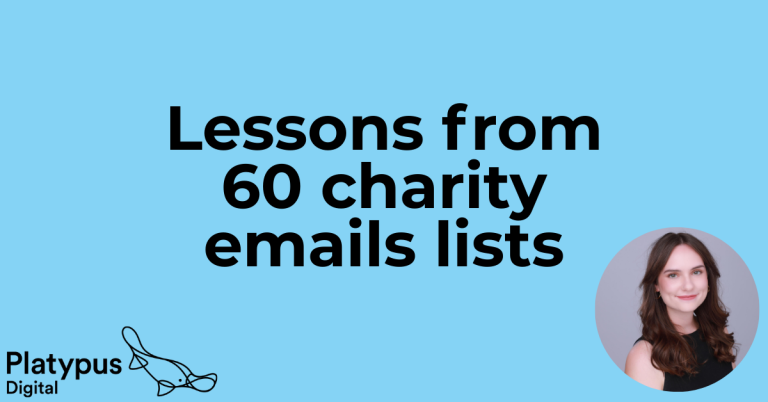On April 21st Google will be updating their search algorithm. Any websites that aren’t mobile-friendly will be penalised and this will mean you’ll see a huge drop in your ranking on Google mobile searches. Remember Panda and Penguin? This one is going to be even bigger.
What’s the change?
Google will be taking into account how mobile-friendly your website is when it ranks your website for relevancy in its results pages on mobile searches. This means that if your site isn’t mobile optimised it could have an instant impact on your ranking. We aren’t talking just a slight fall to position 5 either; you could find yourself clicking through several pages until you find your results listing.
Yep. It’s a biggie.
Why does it matter?
This change matters a lot, especially if you are reliant on your supporters finding you through organic results. If your website isn’t deemed mobile-friendly you are going to see a huge drop in traffic and of course this could have a knock on effect on your donations.
Why are Google doing this?
Google reckon that about 50% of all searches are now on a mobile device so it makes sense that they’d want to reflect this in their algorithm. Love em or hate em, Google are consistently good at ensuring their users get a fantastic user experience and forcing website owners to give it to them!
What can charities do about it?
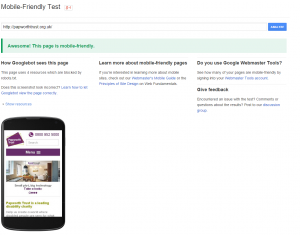
You can also check by searching for your charity on your mobile phone. If it’s mobile friendly it will say “Mobile-friendly” just before the description:
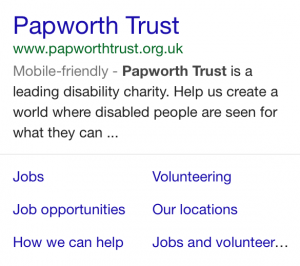
2) If it’s not – don’t panic. Google will explain why it’s not and provide some further information on how to move forward.
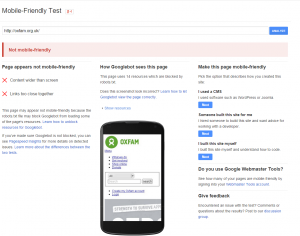
Interestingly Oxfam’s website looks mobile friendly on a mobile, but Googlebot obviously thinks differently.
It’s no consolation, but if your website isn’t mobile-friendly, you certainly aren’t alone. Many huge brands and websites are going to suffer from this update as it stands, including the likes of Nintendo, Next, RyanAir and Channel 4 to name but a few.
What to do if your website isn’t mobile-friendly in the eyes of Google
Take a deep breath…we have bad news. This isn’t going to be something you can fix overnight. We all wish their was a magic button you could press and your site would be mobile-friendly. But hey, if there was you would have done it already right?
Here are a few things you can do to help:
1) Assess the impact
This will only affect your ranking on mobile searches – and it might be that you currently don’t have much mobile traffic. Run a Google Analytics report to see how much of your traffic is coming through mobile. You can find this under Audience -> Mobile.
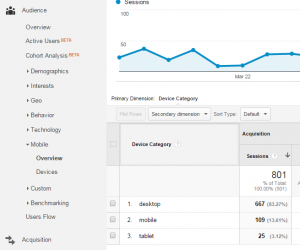
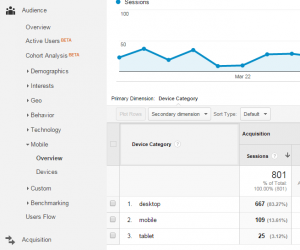
2) Check the search landscape
On your mobile, search for a few key terms you know you rank for. Have a look at the other charities competing against you. Are they mobile friendly? If they aren’t, then the update may not have a huge impact. If they are, then you can bet your bottom dollar they’ll be ranking higher than you.
3) Put a plan in action for making your site mobile friendly
Maybe you’d already tried to get the budget for this and were denied or it just wasn’t prioritised. That’s about to change quick sharp and should now be the top priority. It might be worth hiring an agency or developer to work on this specific project if in-house resource is an issue.
4) Make the most out of your Google Grants account
Check you are bidding on the keywords you know you rank for organically and are particularly important for your charity. This is a good way of helping ensure you have a presence in the search engines.
5) Consider using paid Adwords
For a short term fix, you might want to consider creating an Adwords account you pay for to help tide you over. This doesn’t have to be as comprehensive as your Google Grants account but will allow you to bid for those terms that are either too expensive in Google Grants or keywords you really need to ensure you are ranking for.
Before you all rush off and panic, it’s worth remembering that everyone who owns a website is going to be affected by this change and plenty of people will be penalised as a result. The great news is that it is reversible and actually forces you to move in a direction you’d need to move in eventually. More and more people are using mobile and this latest update from Google simply reflects that.



